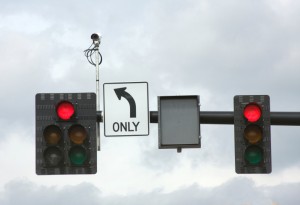Ohio one step closer to banning red light, speed cameras

By Maggie Thurber | For Ohio Watchdog
CAMERA BAN? The Ohio House approved a Senate measure that would effectively ban red light and speed cameras in the state by requiring an office be present for any violations they catch.
The Ohio House of Representatives approved a Senate bill that restricts the use of red light and speed cameras, but not before adding two amendments during their debate Wednesday.
The amended bill will go back to the Senate for concurrence and, if passed, will be sent to the governor for his signature.
Opponents of Senate Bill 342 say it will effectively end the use of red light and speed camersa by requiring that a law enforcement officer be present in order to issue a ticket.
Cities opposed the requirement, saying they didn’t have the personnel to man all the camera locations and that they have worked to reduce speed and eliminate crashes at dangerous intersections.
Supporters of the bill said the cameras served primarily to raise revenue and that if safety was an issue, other measures like increasing yellow light times would work better.
Rep. Mike Dovilla, R-Berea, offered an amendment to require the Department of Public Safety to report to the General Assembly all texting while driving violations. The purpose, he said, was to collect enough data to determine if texting while driving should be a primary offense, instead of a secondary one as it currently is.
But Rep. Rex Damschroder, R-Fremont, asked that the amendment be defeated so he could add his own amendment to make texting while driving a primary offense. His amendment was the same as language in House Bill 637, which he sponsored, that was approved by the Transportation, Public Safety and Homeland Security Committee on Dec. 4.
The debate on the amendment and the bill mirrored much of the testimony heard during committee meetings.
Stating he still believed a complete ban on the cameras was the better way to go, Rep. Matt Huffman, R-Lima, said the issue had been thoroughly vetted and he didn’t want the current bill defeated by adding a texting ban to it.
Rep. Bill Patmon, D-Cleveland, opposed Danshroeder’s plan, asking how anyone could tell whether a driver was actually texting or just looking at directions on their phone, especially considering recent court rulings that said cell phones could not be inspected without a warrant.
Addressing the bill, Rep. Louis Terhar, R-Cincinnati, said the Senate bill addresses all the constitutional issues opponents of a camera ban have raised, including the issue of home rule, which gives cities the ability to govern themselves.
He also supported Dovilla’s texing report amendment to get “data, rather than the emotion” when it comes to a texting while driving ban.
Rep. Ron Maag, R-Lebanon, said the bill was “the next best thing to a complete ban that prevents cities from scamming drivers under the guise of safety.”
He also pointed out that Parma currently follows the provisions in the bill, using both officers and cameras in school zones “truly as a safety measure” and not just for revenue.
Rep. John Carney, D-Columbus, said residents “prefer officers to be out fighting crime and not standing on the corner…writing tickets.”
But Rep. Dale Mallory, D-Cincinnati, said it shouldn’t be an issue of officers doling out camera tickets or completing other police work. He said a representative of Toledo told him they’d laid off 75 officers in the past several years, so they weren’t using officers in other efforts.
Rep. Matt Huffman, R-Lima, said cameras are an issue of “fundamental freedom” because they’re simply “allowing the government to be more efficient at taking your money away.”
Damschroder clarified that his intent in offering his amendment to make texting while driving a primary offense wasn’t an effort to get the camera ban bill defeated.
“I have an amendment that will save lives,” he said. “Getting rid of cameras won’t save any lives, but my amendment will save 30 lives a year.”
Dovilla’s amendment for a report on texting violations was passed by a vote of 54 to 37, so Damschroder didn’t offer his amendment to make texting while driving a primary offense.
The second amendment was offered by Rep. John Barnes, D-Cleveland. It would ensure municipalities could still place red light and speed camera measures on the ballot.
He said Sen. Bill Seitz, the sponsor of the bill, supported the additional language to guarantee citizens the opportunity to weigh on camera use within their communities.
The House approved S.B. 342 by a vote of 58 to 31, across party lines. The Senate is expected to concur with the amendments.







